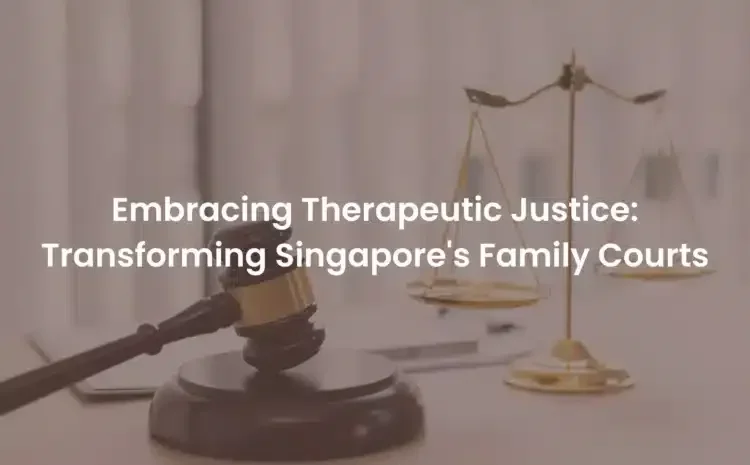Embracing Therapeutic Justice: Transforming Singapore’s Family Courts
Introduction: Breaking up is a challenging journey, and when legal disputes ensue, the process can become not only complex but emotionally taxing. In Singapore, recent cases underscore the potential for bitter court battles arising from divorce. However, the Family Justice Courts (FJC) are ushering in a new era of justice, focusing on therapeutic approaches to ensure families navigate divorce with a focus on healing and positive futures.
A Glimpse into Past Battles: Two recent cases highlighted the acrimony that can arise in divorce proceedings, with accusations of abuse and prolonged legal battles over child custody and asset division. These cases serve as poignant reminders of the emotional toll divorce can take, not only on the couple but also on the well-being of children involved.
The “Broad Brush” Approach: Judge of the Appellate Division Debbie Ong, formerly the Presiding Judge of FJC, emphasizes a “broad brush” approach that eschews petty and calculative conduct. This approach, she explains, encourages a shift from adversarial battles to a problem-solving and resolution-focused court system. The emphasis is on creating a supportive legal structure that promotes therapeutic, positive outcomes for families.
Therapeutic Justice System: Justice Ong articulates the essence of a therapeutic justice system, which looks beyond blame and past grievances, urging parties to let go and focus on building a positive future despite the breakdown of the family unit. In family proceedings, the court becomes a place for problem-solving and resolution rather than a battlefield.
Engaging the Community: The FJC is actively engaging with leaders from the judiciary, academia, and the legal sector to forge multi-sector collaborations. Events like “Conversations with the Community” provide a platform for discussions on the need for therapeutic justice in family proceedings and its implications for Singaporean society.
Changing Legal Culture: The focus on therapeutic justice has prompted a shift in legal culture. Family lawyers are now expected to be advocates for mediation and settlements, encouraging amicable negotiations even before court filings. The adversarial culture has given way to a problem-solving approach, reflecting a changing paradigm in family law.
Equipping Lawyers for the Future: As part of this shift, lawyers are acquiring new skills to navigate the changing landscape. Training in collaborative law, mediation, and interpersonal communication is becoming increasingly common, preparing lawyers to play a role in encouraging fair and amicable settlements.
The Role of Social Services: Singapore’s Family Justice Courts are not only focused on legal proceedings but also emphasize early intervention by connecting families with social service agencies for counseling. This holistic approach helps families cope with issues before they escalate to legal battles.
Positive Outcomes and Sustainable Solutions: Therapeutic judgments, specialized training for judges, and a focus on sustainable outcomes characterize the new approach. The objective is to enable families to cooperate even after divorce, fostering a positive future and preserving healthier relationships, particularly for the children involved.
Conclusion: As Singapore’s Family Justice Courts transition towards a therapeutic justice system, the emphasis on healing, problem-solving, and positive futures is transforming the landscape of family law. With an evolving legal culture, a focus on equipping lawyers for the changing paradigm, and a commitment to community engagement, the FJC is at the forefront of ushering in a new era where families can navigate the challenging terrain of divorce with empathy, support, and a vision for a brighter future.

